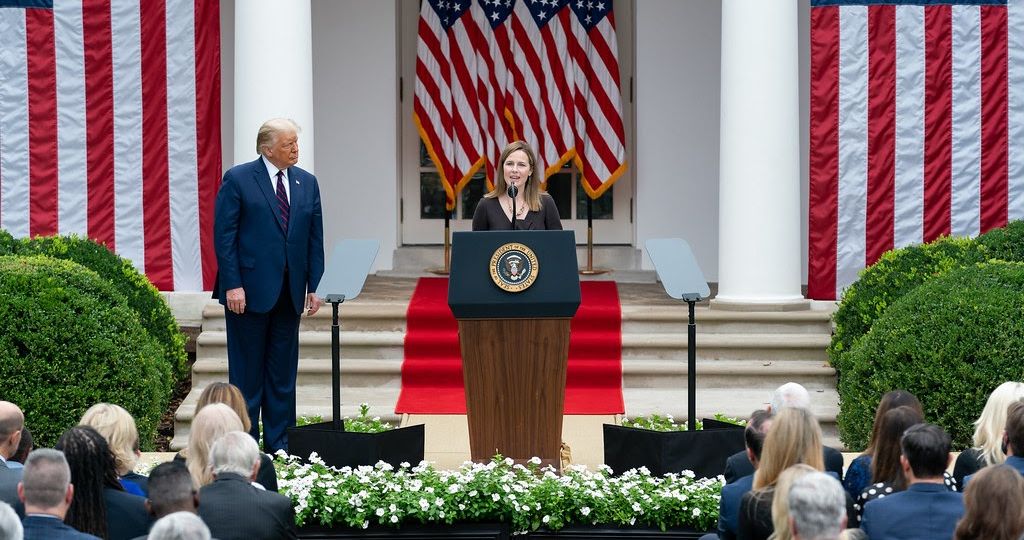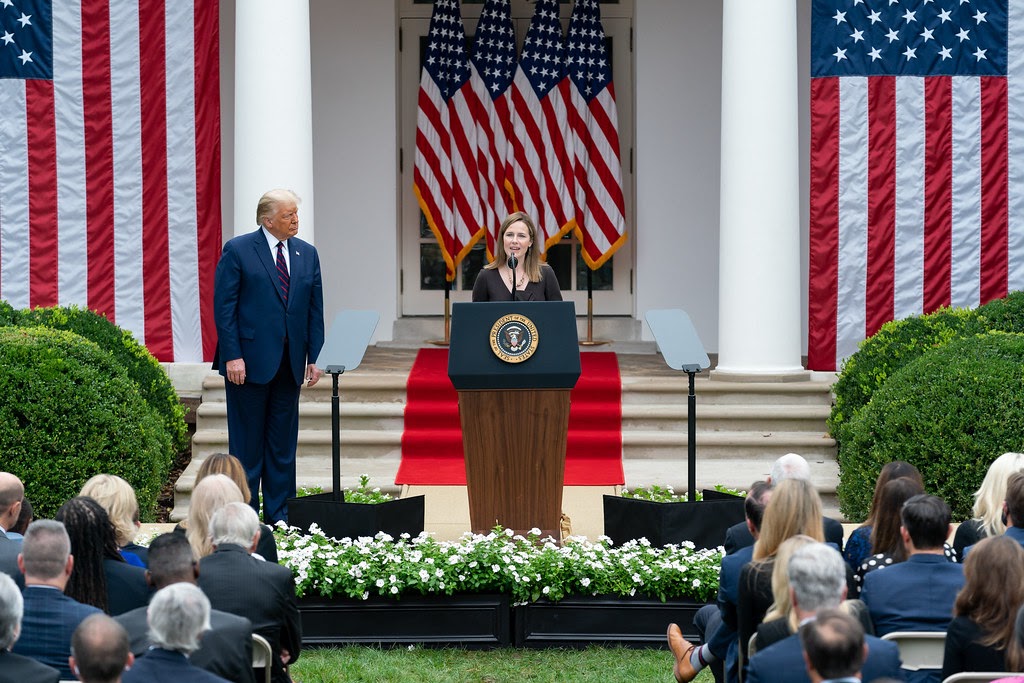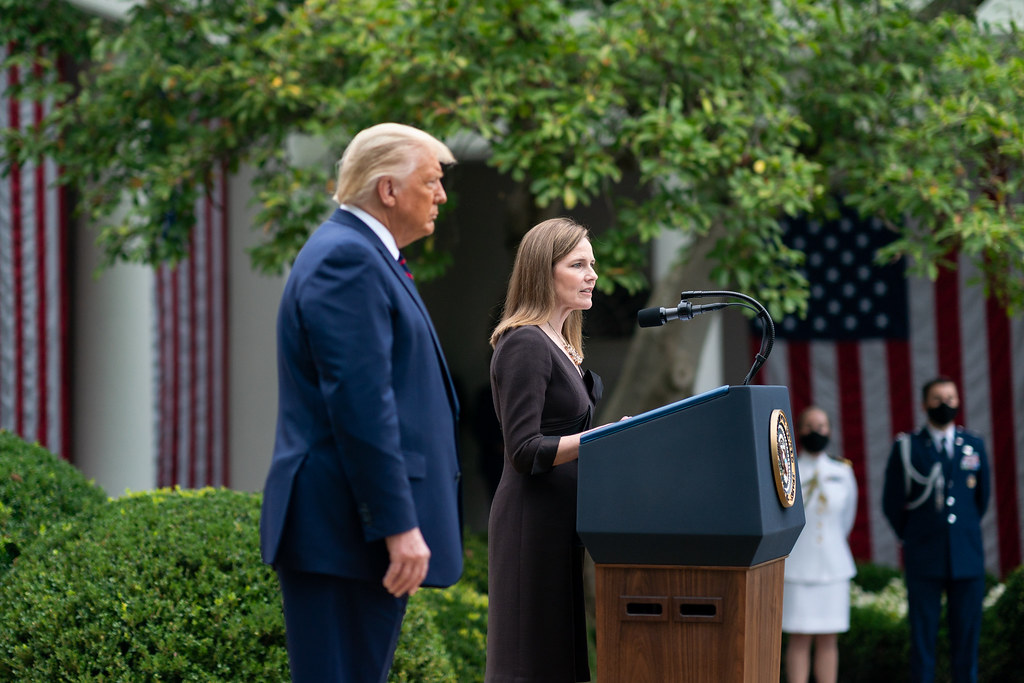
How Amy Coney Barrett’s Supreme Court Confirmation Could Impact Abortion Access
Judge Amy Coney Barrett, Trump’s pick for Supreme Court justice, raises concerns about the future of reproductive rights.

Amy Coney Barrett was sworn in as the 115th justice on the Supreme Court by Chief Justice John Roberts on Tuesday, Oct. 27. After a four-day confirmation hearing, the devout Catholic federal appeals court judge and legal scholar was confirmed by the Senate, voting 52-48.
Barrett is Trump’s third Supreme Court appointee, leaving a legacy of creating a 6-3 conservative majority. Barrett’s confirmation raised a number of concerns for the Democratic Party, questioning who she is and where she stands on big issues.
Born in the suburbs of New Orleans, Barrett graduated from Rhodes College in Memphis, Tennessee, with a B.A. in English literature. Barrett went on to attend Notre Dame Law School in South Bend, Indiana. Following her time in academia, she clerked for conservative judges: the late Supreme Court Justice Antonin Scalia and Washington federal appeals court judge Laurence Silberman. Barrett taught as a professor of law at Notre Dame Law School full-time before Trump nominated her to serve on the federal bench in Chicago in 2017.
Until 2017, Barrett had never been a judge; her primary career was spent in academia. During her brief three years as a federal appeals courts judge, she never tried a case to verdict or argued an appeal in court. Based on past Supreme Court appointees’ records working in law and government, three years is an unprecedented time as a judge to be appointed to the Supreme Court.
Barrett filled the vacancy of the late women’s rights activist Ruth Bader Ginsburg. Also known as the Notorious R.B.G., Ginsburg helped inspire a new wave of feminism that shaped the foundation of creating equal rights for women.

Some ask, what does Barrett plan to do with her time serving on the higher court? One hot topic has been Barrett’s view on abortion, as it was brought up during her confirmation hearing and the media often discusses the possibility of the Supreme Court having the power to overturn Roe v. Wade.
Roe v. Wade was the 1973 landmark decision that declared abortion was protected under the right to privacy under the 14th Amendment, essentially legalizing the procedure throughout the United States. The legislation from the Supreme Court followed Norma McCorvery, going by the pseudonym “Jane Roe”, challenging Texas anti-abortion laws. Prior to the verdict of Roe v. Wade, abortion was illegal in most of the United States. Roe v. Wade remains one of the most important decisions by the Supreme Court when it comes to protecting women’s rights. Without the federal protection of Roe v. Wade, abortion rights would be a state to state decision, allowing for the possibility of making abortion illegal in some states.
“Amy Coney Barrett’s confirmation is likely as daunting a prospect for those of us on the political left as the late Ruth Bader Ginsburg’s was to the political right,” said Kaifa Roland, an associate professor of anthropology at the University of Colorado Boulder and chair of women and gender studies. “My understanding of her judicial record and public writings is that her brand of conservatism poses a threat to the rights of all American women who may not have the economic standing to have their interests fully represented in a court of law.”
According to a 2013 Notre Dame Magazine article, Barrett stated she believes life begins at conception. The magazine also noted that, at the time, she believed it was “very unlikely” that the Supreme Court would ever overturn Roe v. Wade. However, with the new conservative majority, that may change.
“My fear is that perceptions of a vast cultural divide in our country will be magnified by the new conservative majority. My hope is that Chief Justice Roberts and at least one other of the conservative justices occasionally breaks rank, in ways that bridge that divide,” Roland said.
Well known anti-abortion activists’ groups rooted for Barrett’s nomination. Marjorie Dannenfelser, the head of the anti-abortion rights group Susan B. Anthony List, advocated for Barrett, saying, “She is the perfect combination of brilliant jurist and a woman who brings the argument to the court that is potentially the contrary to the views of the sitting women justices.”
With the support of the one of the largest anti-abortion groups in the country, along with Barrett’s personal affiliations, many think it gives insight on where she stands on abortion.
“She has ruled in favor of abortion restrictions as a judge. She has shown herself to be in favor of limiting access to abortion,” said Lisa Radelet, communications director at The Boulder Valley Women’s Health Center. The BVWH clinic has been around since 1973 and was the first abortion clinic in the state of Colorado.
According to the ABA Journal, in the case of Box v. Planned Parenthood of Indiana and Kentucky Inc., the Seventh Circuit ruled to block an Indiana law requiring parental consent for minors seeking abortions. Barrett was on the side that dissented this verdict. Another case, Commissioner of the Indiana State Department of Health v. Planned Parenthood of Indiana and Kentucky Inc., delegated an Indiana law that could  ban abortions in accordance with race, sex, a diagnosis of down syndrome and requiring fetal remains to be buried or cremated. The law was struck down; however, Barrett dissented again, requesting the case be retried.
ban abortions in accordance with race, sex, a diagnosis of down syndrome and requiring fetal remains to be buried or cremated. The law was struck down; however, Barrett dissented again, requesting the case be retried.
“During her hearing when asked directly about Roe and whether she considered it a super precedent, like something that would have to be respected and not touched and not overturned, she wouldn’t answer that,” Radelet said. “Well she sort of did answer that, she said didn’t really consider it a precedent in the same category as other cases because it’s something that people are still arguing about and is controversial.”
Beyond Roe v. Wade, there are a number of loophole cases that could restructure abortion rights. For example, Mississippi Attorney General Lynn Fitch has been pushing the Supreme Court to review its 15-week abortion ban, which is in direct violation of Roe v. Wade.
“Some states have said banning abortion after 20-weeks, or after 18-weeks, or after 15-weeks, or after 6-weeks,” Radelet said about the varying state laws on abortion. “Several states have even gone down to 6-weeks, which most people are just finding out their pregnant at 6-weeks. Those are all unconstitutional under Roe because Roe protects access to abortion up to fetal viability, which is about 24-weeks.”
Despite Barrett’s past writings and religious affiliations, her statements during the confirmation gave no definitive answer on how she would address Roe v. Wade.
During a White House ceremony on Oct. 26, Barrett gave her remarks on how she views her role as the fifth woman to serve on the Supreme Court.
“The oath that I have solemnly taken tonight means at its core I will do the job without fear or favour and do it independently of the political branches and of my own preferences,” Barrett said.

